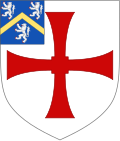
The chancellor is the ceremonial head of Durham University, with the formal duties of conferring degrees at congregations and of being an ambassador for the university. They are nominated by the council and senate in joint session and appointed by convocation, determined by the majority of votes of members of congregation present and voting. [1] [2] [3] The incumbent is Fiona Hill, who was appointed by convocation in November 2022 and installed in June 2023. [4] [5]
Contents
Until 1909, the university was governed by the dean and chapter of Durham Cathedral, with the warden (held ex officio by the Dean of Durham from 1862) being both the formal and executive head of the university. Following the implementation of statutes made in 1909 under the University of Durham Act 1908, the warden became the chancellor with the sub-warden becoming the vice-chancellor, meaning Durham was, like most other British universities, headed by a chancellor. [6] [7] Thereafter, the post has been held by eminent aristocratic, political, academic and cultural figures.
